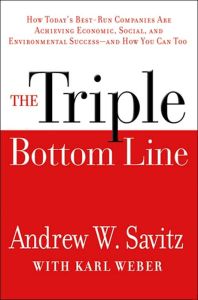Join getAbstract to access the summary!

Join getAbstract to access the summary!
Andrew W. Savitz and Karl Weber
The Triple Bottom Line
How Today's Best-Run Companies Are Achieving Economic, Social, and Environmental Success — and How You Can Too
Jossey-Bass, 2006
What's inside?
Sustainable business is the "sweet spot" for better financial, environmental and social performance. Join the future.
Recommendation
Sustainability is "the art of doing business in an interdependent world" according to consultant Andrew W. Savitz, who urges companies to focus on the "triple bottom line": solid profit, environmental quality and improved human welfare. Drawing on his experience as head of PricewaterhouseCoopers’ sustainability practice, Savitz (writing with Karl Weber) makes a compelling case for moving your business toward "a sustainability sweet spot" where shareholders, environmental interests and other stakeholders can all feel satisfied. Sound like reheated corporate responsibility leftovers? Don’t worry. This book offers much more than soft-headed "birdies and butterflies" rhetoric or a few threadbare anecdotes. Savitz marshals truly compelling arguments based on widely accepted demographic, regulatory and cultural trends. Even robber barons will feel the pull of his message, partly because the book is so engaging and well-paced that it reads like a novel, and partly because his prescriptions are so clear, coherent and actionable that they seem like common sense. getAbstract highly recommends this sustainability guidebook to those who want to begin the journey on which such companies as Toyota, GE, PepsiCo, Nike and Unilever have already embarked. Bottom line: you can’t afford to ignore sustainability.
Summary
About the Authors
Andrew W. Savitz runs a sustainability advisory firm in Boston. Previously, he was a lead partner in the Sustainability Business Services Practice at PricewaterhouseCoopers and a senior environmental enforcement official for the state of Massachusetts. Karl Weber is a best-selling nonfiction writer specializing in business, social and political topics.



















Comment on this summary